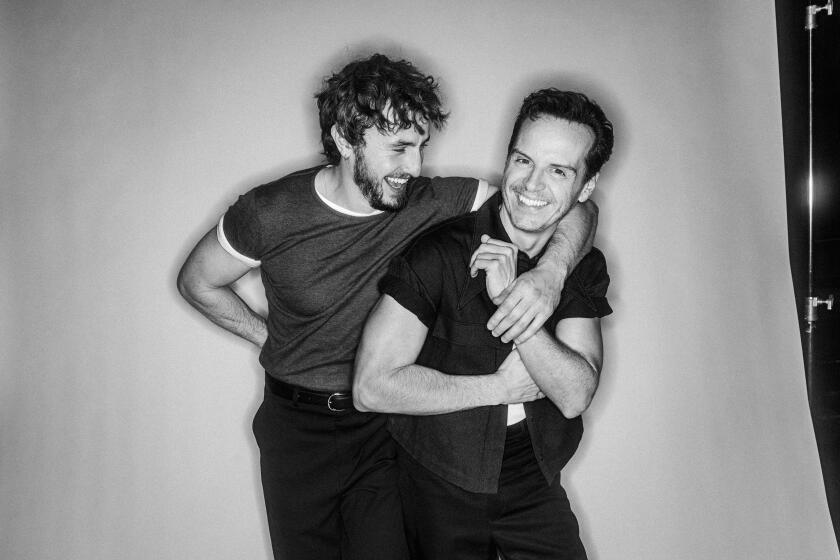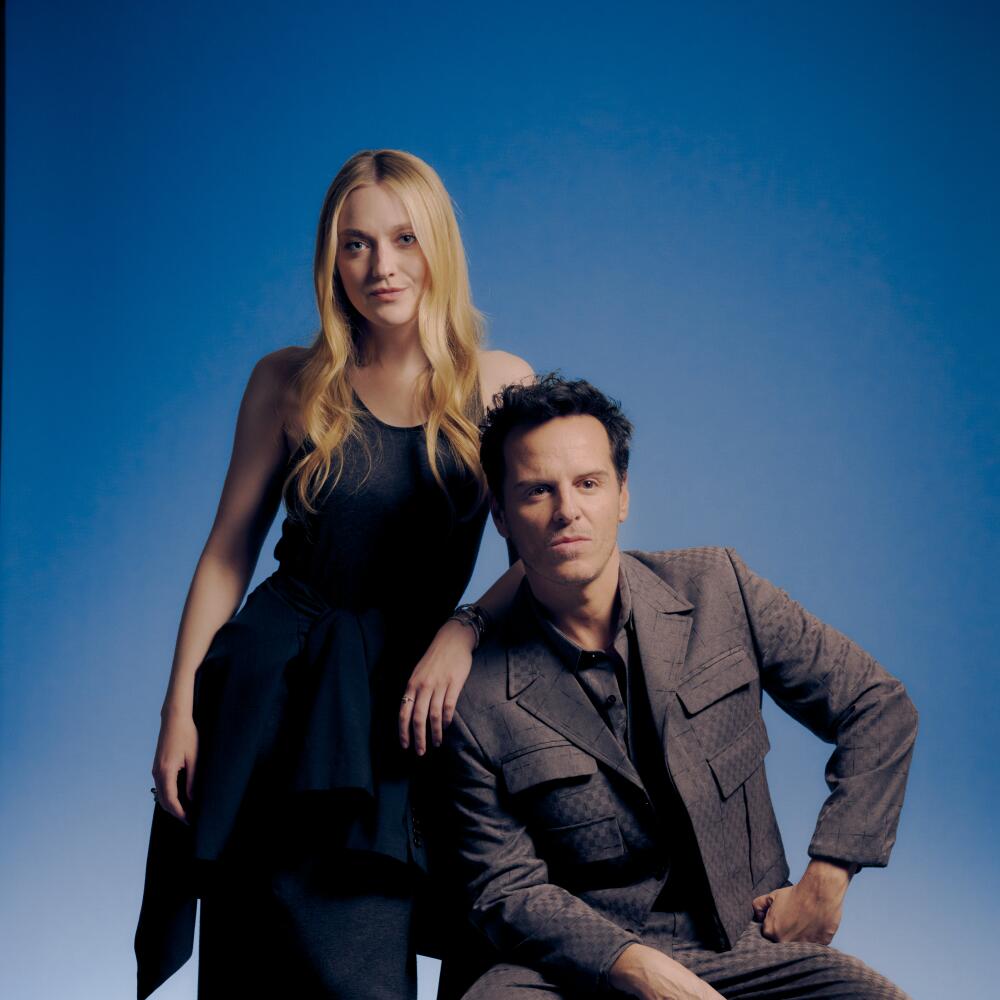
- Share via
In early March, as the collective obsession it spawned was at its height, I had the chance to ask: Have Andrew Scott and Dakota Fanning seen the viral TikTok series “Who TF Did I Marry?”
The actors were seated in a sparsely decorated holding room at a Hollywood screening venue where their new limited series, “Ripley,” was about to be previewed. Nearly seven decades after Patricia Highsmith’s novel “The Talented Mr. Ripley” first introduced the world to its titular grifter, Tom, the story of one of pop culture’s most infamous pathological liars is now getting an eight-episode treatment on Netflix. And the 50-part social media saga by Reesa Teesa (real name Tareasa Johnson) about a walking red flag — an ex-husband who allegedly made up family members, faked phone conversations and, in their search for a home, duped her with fake bank statements that turned out to be screenshots from Google Images — was further proof that stories of scammers and fraudsters never go out of style.
“Oh, my God, I know!” Fanning said, her eyes wide with excitement. “I wanted to watch that, but haven’t. There are a lot of videos, right?”
“What is this?” Scott asked, curious to understand the enthusiasm.
“It’s this woman who got scammed by her ex and made these videos where she is like filming in the bathroom or her car and telling the story,” Fanning said.
“Oh, wow,” Scott said, brows furrowed.
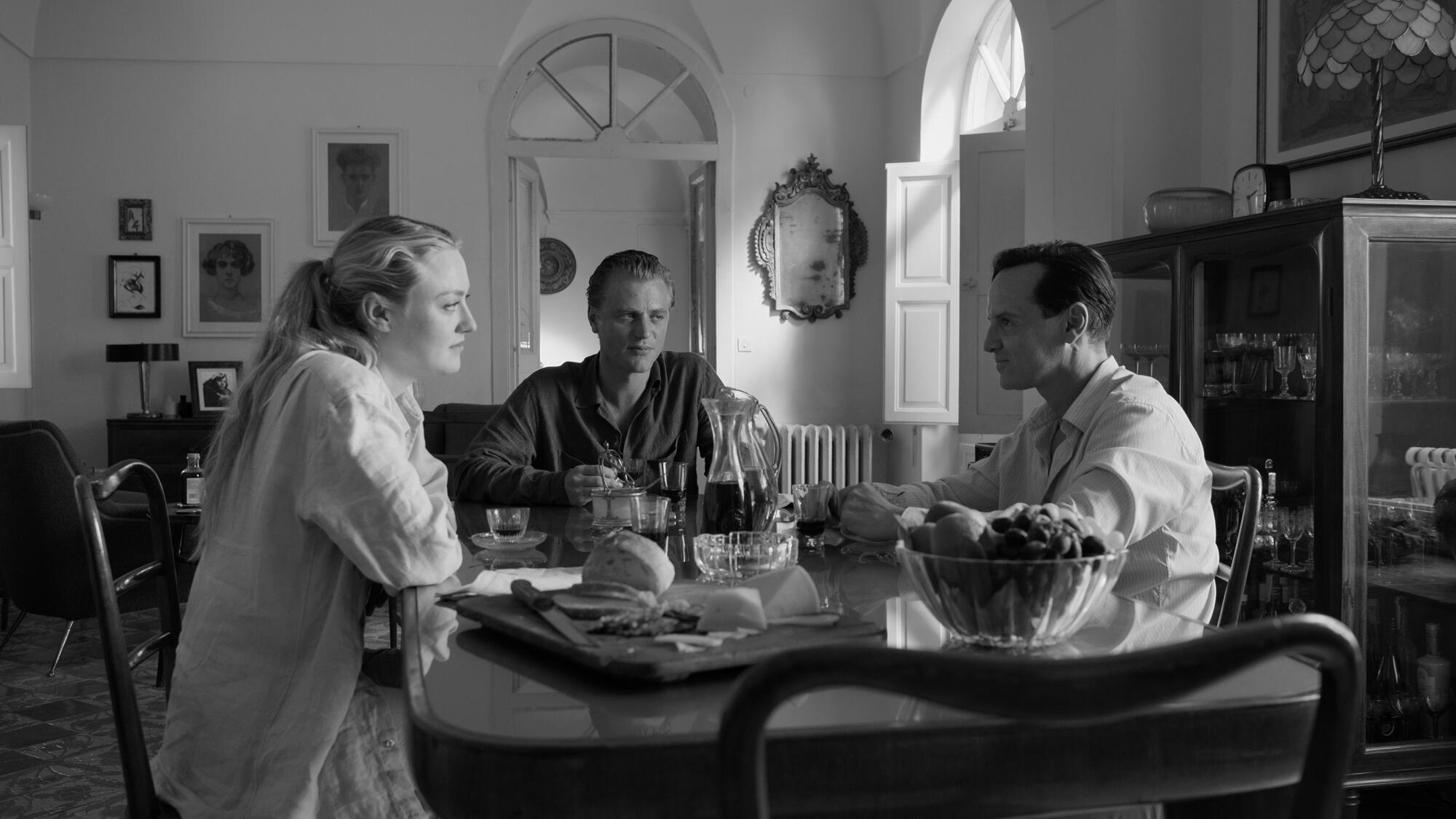
The cunning con man who’s brought them together has left a more lasting impression, inspiring the 1960 French film “Purple Noon,” the 1999 vehicle for Matt Damon, Gwyneth Paltrow and Jude Law, and now “Ripley.”
Developed for television by Steven Zaillian (“The Night Of”), the series was originally set up at Showtime before moving to Netflix, with production spanning from summer 2021 to spring 2022. The lavish thriller, which is shot in black and white, stars Scott as the eponymous scam artist; Johnny Flynn (“Emma”) as Dickie Greenleaf, the wayward heir to a wealthy Manhattan dynasty with whom Ripley becomes obsessed; and Fanning as Marge Sherwood, Dickie’s girlfriend, who is suspicious of the new man in town.
The dark, subversive antihero saga begins as Tom is enlisted by Dickie’s father , who mistakenly assumes Tom is a friend of his son , to venture to Italy to cajole him into returning home. Tom becomes infatuated with Dickie and his lifestyle, then kills him to avoid being deserted — and the cover-up spirals from there. It’s an apt parable for the social media age, in which the carefully crafted image can be seductive to a damaging degree. But Zaillian didn’t embark on the adaptation with that in mind.
“It had nothing to do with now,” Zaillian said by telephone. “The big draw for me was to spend more time with this particular character. ... I think there’s a lot of things about him that are like all of us. He has aspirations, he has envy, pride — he might have more than we have, or he’s just willing to go further to get it. I think one of the reasons that he’s endured as a character so well over all these years, is because we do relate to him.”
While Dickie is the person Tom becomes fascinated by, the dynamic between Tom and Marge brings the tension.
“Their relationship changes,” Zaillian said. “From the moment she meets him, Marge is suspicious of him. At a certain point, he appeals to her vanity. She starts to think, ‘Well, maybe he is OK,’ because, frankly, she’s gonna get something out of it. And so it kind of goes back and forth. Her opinion on him constantly changes.”
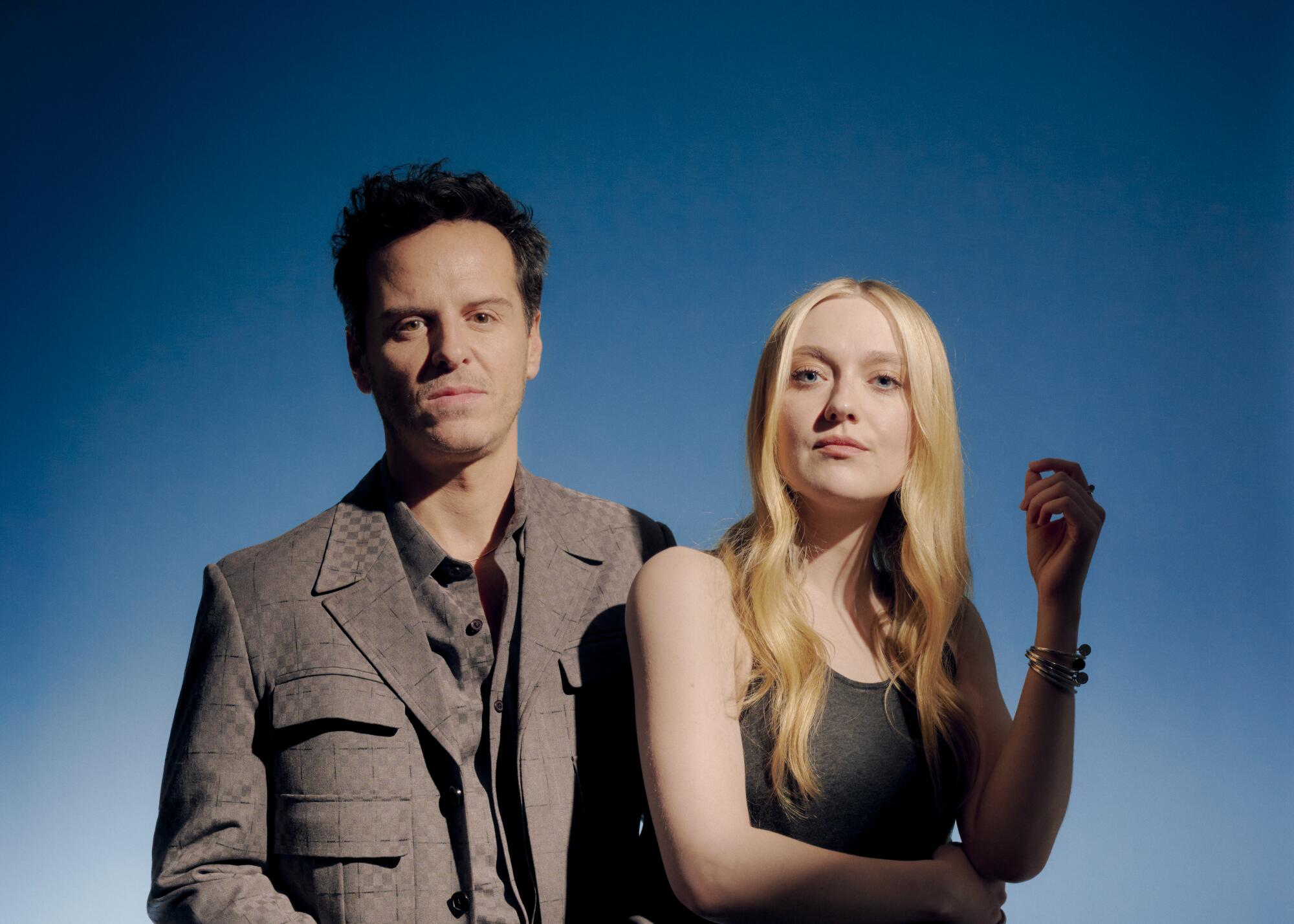
Scott and Fanning talked about their own experiences being duped, why we can’t get enough of con artists, and climbing all the series’ stairs.
What do you think it is about con artists that audiences stay fascinated by?
Scott: We talk so much about backstory when we’re talking about characters and I sometimes think that’s just mythical, because when you’ve got backstory about somebody, you have power. When you don’t, [the character has] all the power. It’s more sinister.
Fanning: I think Tom Ripley is the original catfish. Also, what kind of separates it from other interpretations of con men, or whatever you want to call it, is you kind of get to see how he does it all, in pretty gripping detail. Sometimes some of those details are glossed over; in this, you’re on that ride of how it’s all done and I think that makes the particular character of Tom Ripley even scarier. Also, you start sympathizing with him.
Scott: And you see his mistakes.
Fanning: I should want him to get caught, but I don’t.
Scott: I was always like, “I want to be able to feel what it’s like to be him, not necessarily be a victim of his” ... “What would I do if I was him in these moments?”
“The Talented Mr. Ripley” really asks the question, “Is it better to be a fake somebody than a real nobody?” And it grapples with the cost of buying into the life you’re fed to believe is ideal. What did you find interesting in exploring the complexity of those themes against the social media era we live in?
Scott: It’s about somebody who’s literally not being seen by a lot of people. Really just lives in the undergrowth. What I find moving about it is that I think he’s got a great appreciation for all the stuff that Dickie Greenleaf just takes for granted. He’s really brilliant at what he does. Dickie and, to a certain extent Marge, are not great artists, but they have that totally at their disposal. There’s a theme of who gets access to the arts, and who is able to go to these beautiful locations and educate [themselves]. Tom, as he’s doing all these extraordinary things, is actually falling in love with Italy, painting and food and clothes and just the beauty of the world.
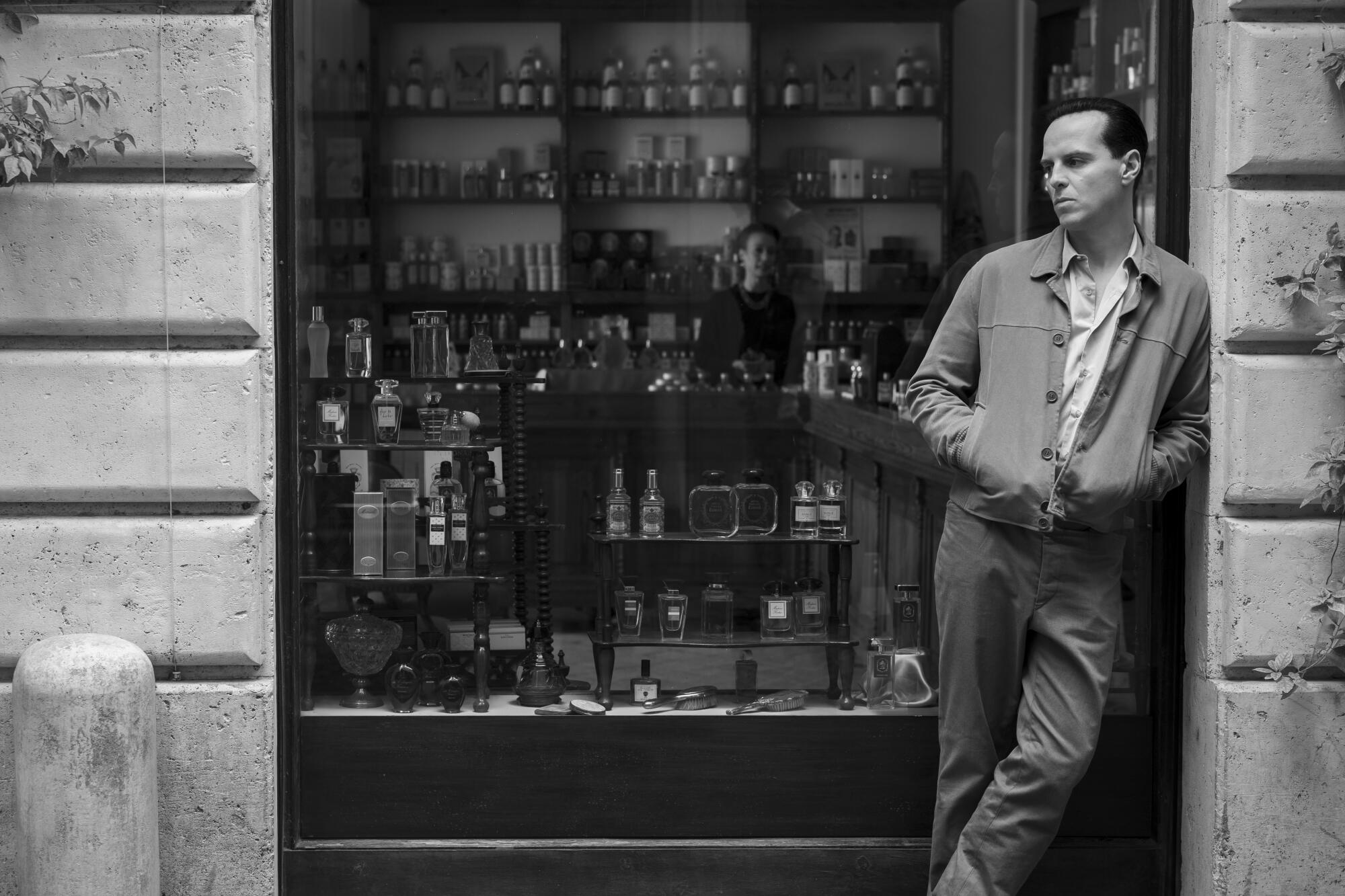
“It’d have devastated me to see somebody else play it. I don’t think I could watch it,” Paul Mescal says, contemplating his reaction if he hadn’t landed a role in the Andrew Haigh film..
As an actor, your goal is to make an audience believe that you’re somebody else and you will go to your own lengths to do that. Did it give you insight into what’s driving Tom or how far he’ll take it?
Scott: He’s not a natural-born killer. He’s not going over there with any of this in mind. He’s trying to survive.
Fanning: Somebody approached him.
Scott: Exactly. Somebody approached him. He didn’t do anything. Then he caught some feelings. Then that happened. All these extraordinary places he goes to aren’t because he’s going, “Oh, I always wanted to go to Venice.” He goes there because he has to.
Maybe not to the extent of what we see in this series, but have you ever been duped?
Fanning: The feeling that I hate the most is being tricked and duped — even in small ways when you feel like everyone else knows something that you don’t know. I hate that. It’s awful.
Scott: I will give you a specific example that happened to me last week. I arrived to Los Angeles. I was really jet-lagged, it was about 8 o’clock. I thought: OK, I’m going to go to the gym to keep me alive. And it’s a well-known, good gym. Went to do my workout and put my stuff in the locker. When I finished and went to take a shower, I thought, I’m not gonna put my trainers into my locker; I’m only going to be in the shower for five minutes. I come out and someone had stolen my trainers! There’s just one sock there. I was like, “What the f—?” You just feel so violated. And I’m thinking, “I have to go home. My shoes are gone.” So I had to wear these extraordinarily massive flip-flops from the spa. I still can’t believe someone stole my trainers and one sock. But it is a really weird feeling to be stolen from. I know you can be emotionally conned. I’ve experienced that before as well, with one of those bank fraud things. You do feel something has just been ripped from you. It’s a horrible feeling.
Tom is always paranoid about being watched. You both are public figures. Can you understand that paranoia?
Fanning: It doesn’t just have to do with being an actor or a celebrity anymore. I try and keep everything together. But there was one time that I was learning to drive and I was with my mom. We didn’t have a destination; I was just practicing. And there was paparazzi following behind me every turn and watching me park. I finally got out of the car and I was like, “I am trying to learn to drive. I am not going anywhere. You’re going to be going up and down this hill all day.” He was very nice. One time, I was moving into my house and my garage and he — it happened to be the same man — was parked nearby and I was like, “Please don’t film me moving my personal items into my house.” But in general, I think now everybody worries about being surveilled in some way.
Andrew, do you notice when it’s happening to you? When someone has their phone positioned a certain way?
Scott: Absolutely. And my real feeling about it is: just be better at it. Be better at disguising it! Not for anything to do with what my job is, just as a human being. It’s the fact that you think I can’t notice how obvious you are making it. Recently, I was on the tube in London, it was this relatively empty tube, and this girl [mimics person pointing phone in his direction] and she very badly took a photo and the flash went off. And I turned and was like, “If you want a picture, please just ask me.” And she was like, “I didn’t take a picture of you.” Somebody from down the car was like, “Mate, we saw it. You did. The flash went off.” So then she got up and got off at the stop. The shame. She was Tom Ripley! She was just lying to my face.
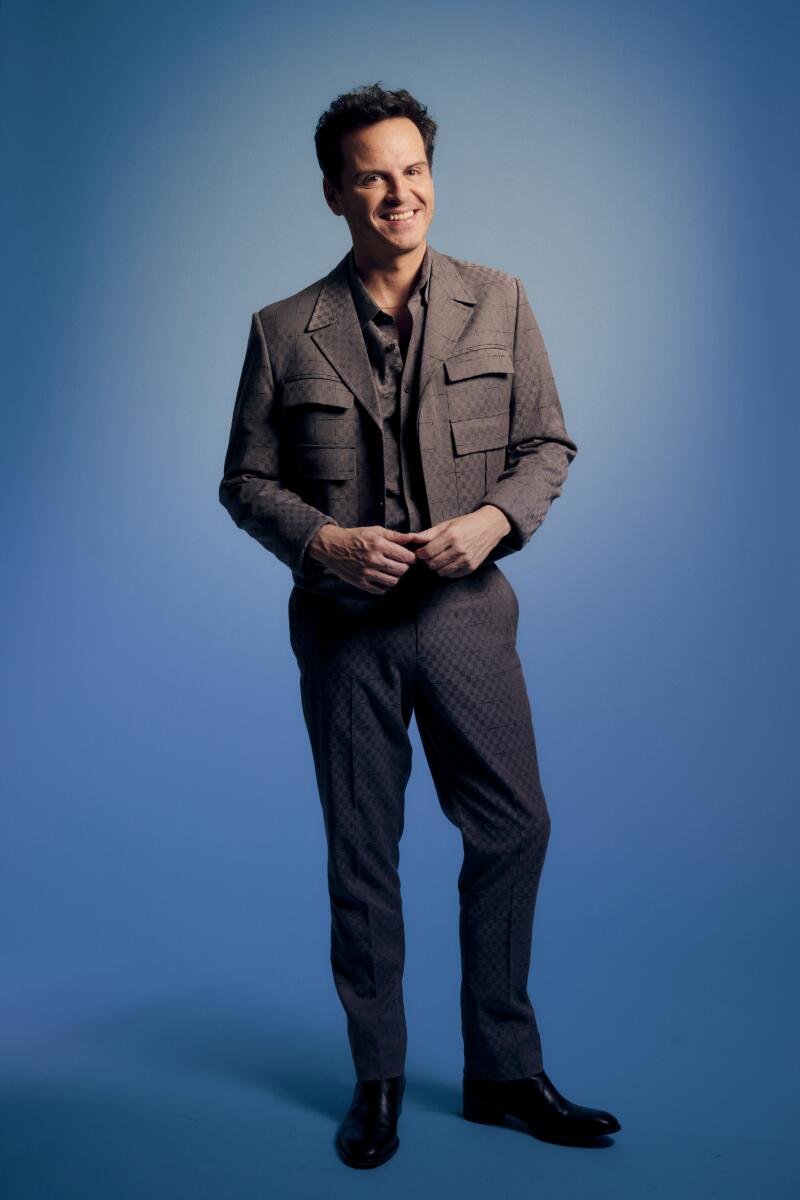
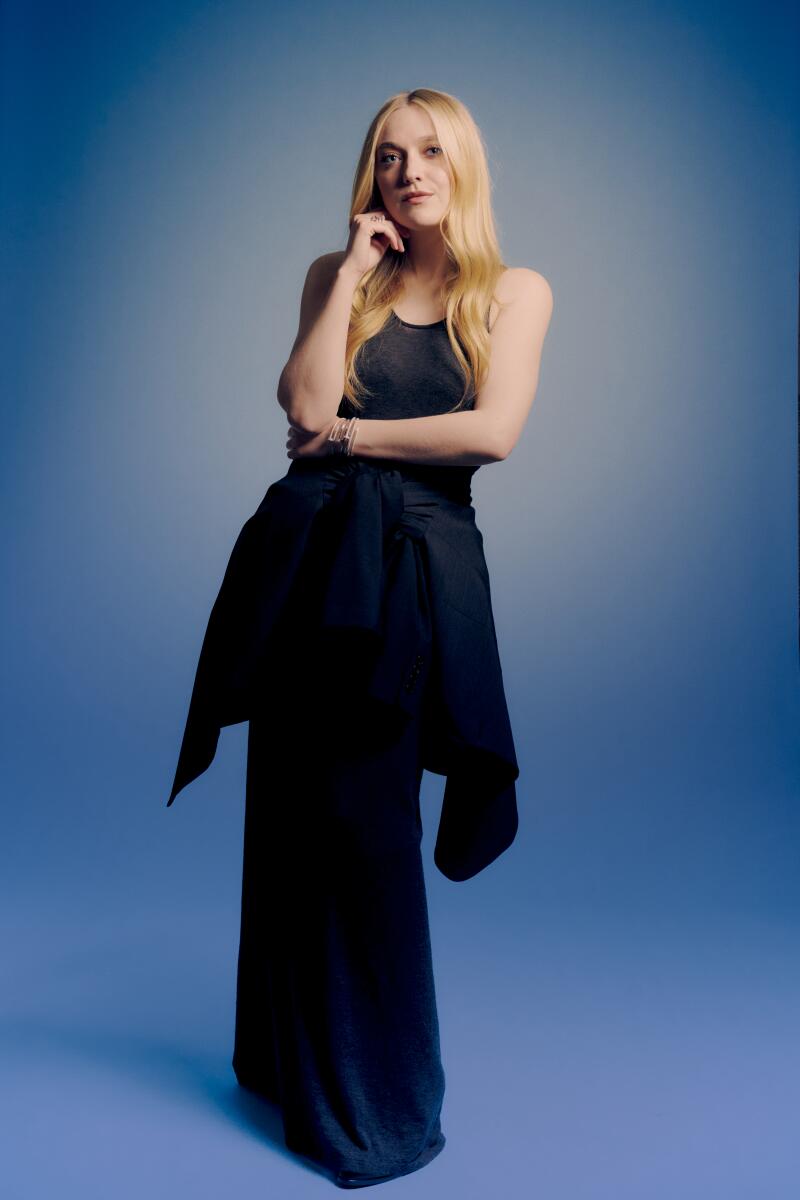
1. “I know you can be emotionally conned,” says Andrew Scott, who plays the grifter Tom Ripley. 2. “The feeling that I hate the most is being tricked and duped,” says Dakota Fanning. (Evelyn Freja / For The Times)
I want to talk more about the Marge-and-Tom dynamic. Unlike the 1999 adaptation, where Marge is more warm and welcoming to Tom and wants him to fit in, in the series, like in the novel, she’s skeptical of him from the start. How did you map out the pacing of her wariness?
Fanning: The interesting thing about the novel and the scripts is that they’re written from Tom’s perspective. The other characters have to fill in a lot of blanks. At first, that felt overwhelming. But Steve’s gift is his precision as a writer and as a director and the fact that he, whether it’s what you want to hear or not, knows exactly what he’s looking for and what he wants. I think my instinctual interpretation of Marge he was happy with, which was a relief to me. But we definitely played with it, like, “Let’s do a take where she doesn’t believe him” or “Let’s do one where she isn’t so skeptical.” And then he would figure it out later — what Marge knew, what Marge didn’t know. It was a little bit of a puzzle of keeping track of the timeline of her skepticism. But I was thrilled to play a character, a woman, that wasn’t completely duped. I love that this Marge is quite skeptical from the beginning and we got to have fun with that.
They’re very much a mirror of each other.
Fanning: And her background is also not a privileged background. The jealousy of her is, “You and I are alike, but you have it and I don’t. And you don’t deserve it still.”
Scott: They see through each other. They’re threatened by each other and you dislike about other people what you see in yourself. But I really believe that Tom loves Marge. I think it’s too easy to think: “Oh, he hates her.” I think he finds her inconvenient because she, of all people, might mess it up for him. And Dickie is a little bit more trusting or maybe just not as emotionally intelligent.
Fanning: They’re frenemies.
Sexuality in Patricia’s novels is sort of up to interpretation sometimes; it’s subtext. Andrew, what discussions did you have with Steven about how you wanted to approach that part of his identity?
Scott: I suppose it was something that I thought about a lot myself; it was very important to me to not label him too much. I did have some brief conversations with Steve about that. ... We’re very concerned with labeling in 2024. I feel like he’s a character with a lot of secrets. And talking around it too much, I feel I’ve got to protect that character. I think you have to dramatize asking the questions rather than drowning the character in giving the easy answer to appease certain people’s ideas. To my mind, he’s a character who is Other. I feel like he wouldn’t be comfortable in a gay bar; I feel like he wouldn’t be comfortable in a straight bar.
Sometimes I think his sexuality or sensuality comes out of his relationship with things — art, clothes, props, music. I love the fact that we don’t know. I think there’s a lot of people who can relate to that. I enjoy the idea of pushing that — for him to be flirtatious with a man; for him to be flirtatious with a woman — and not diagnose him too much and not to impose too much of a sexuality. And I applied that to everything about him, not just his sexuality. He’s the hero, but he’s an unreliable hero.
In the book, the three characters are very clearly telegraphed as being in their early to mid-20s, fresh out of college. How does a version of these characters who are somewhat closer to your age change your understanding of their behavior?
Fanning: I didn’t think about it. I feel like everyone is almost ageless in it. Obviously with Marge, you can tell she’s somebody who is kind of bright-eyed and bushy-tailed and finds herself in this place and hasn’t had a lot of experience. She’s not a world traveler. This could be her first time out of the country. If I was thinking about age, I was thinking this is all still kind of new for her.
Scott: It was a concern because, obviously, in the book, he’s younger than I am... But that’s not what [Highsmith] concerns herself with too much. Again, the sort of slipperiness of watching their behaviors and not caught up with: “What’s the age difference here?” We’re not playing something like the evolution of teenagers. That’s not what the theme of it is and, so, it isn’t really something that we thought about.
Fanning: Steve didn’t care, so we didn’t care.

Andrew, talk to me about the stairs. You had to endure a lot of stairs in the series.
Fanning: Oh God.
Scott: There was a lot of stairs. We got a lot of coverage ... of a lot of stairs.
I can’t tell by the tone if he’s really upset by the memory.
Fanning: [laughs] No, he’s not upset. It’s just the truth.
Scott: [laughs] It’s just the truth. That’s the thing — it’s very evocative because when you go [to Italy], you’re going up lots of stairs. There’s no choice. To see what it’s like for a person from New York, who’s experiencing this for the first time and has no money, and he’s making mistakes, he can’t speak the language. But yes, there’s a lot of those stair scenes where he’s got up and life is just tough. Steve isn’t a one-and-done guy, so we certainly had a lot of takes with the stairs.
More to Read
The complete guide to home viewing
Get Screen Gab for everything about the TV shows and streaming movies everyone’s talking about.
You may occasionally receive promotional content from the Los Angeles Times.
